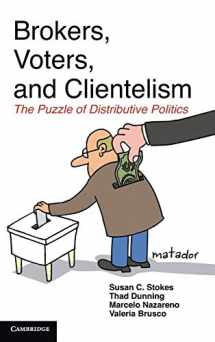
Brokers, Voters, and Clientelism: The Puzzle of Distributive Politics (Cambridge Studies in Comparative Politics)
ISBN-13:
9781107042209
ISBN-10:
1107042208
Edition:
Illustrated
Author:
Thad Dunning, Susan C. Stokes, Marcelo Nazareno, Valeria Brusco
Publication date:
2013
Publisher:
Cambridge University Press
Format:
Hardcover
344 pages
Category:
Economics
FREE US shipping
Book details
ISBN-13:
9781107042209
ISBN-10:
1107042208
Edition:
Illustrated
Author:
Thad Dunning, Susan C. Stokes, Marcelo Nazareno, Valeria Brusco
Publication date:
2013
Publisher:
Cambridge University Press
Format:
Hardcover
344 pages
Category:
Economics
Summary
Brokers, Voters, and Clientelism: The Puzzle of Distributive Politics (Cambridge Studies in Comparative Politics) (ISBN-13: 9781107042209 and ISBN-10: 1107042208), written by authors
Thad Dunning, Susan C. Stokes, Marcelo Nazareno, Valeria Brusco, was published by Cambridge University Press in 2013.
With an overall rating of 3.5 stars, it's a notable title among other
Economics
books. You can easily purchase or rent Brokers, Voters, and Clientelism: The Puzzle of Distributive Politics (Cambridge Studies in Comparative Politics) (Hardcover) from BooksRun,
along with many other new and used
Economics
books
and textbooks.
And, if you're looking to sell your copy, our current buyback offer is $0.3.
Description
Brokers, Voters, and Clientelism addresses major questions in distributive politics. Why is it acceptable for parties to try to win elections by promising to make certain groups of people better off, but unacceptable - and illegal - to pay people for their votes? Why do parties often lavish benefits on loyal voters, whose support they can count on anyway, rather than on responsive swing voters? Why is vote buying and machine politics common in today's developing democracies but a thing of the past in most of today's advanced democracies? This book develops a theory of broker-mediated distribution to answer these questions, testing the theory with research from four developing democracies, and reviews a rich secondary literature on countries in all world regions. The authors deploy normative theory to evaluate whether clientelism, pork-barrel politics, and other non-programmatic distributive strategies can be justified on the grounds that they promote efficiency, redistribution, or voter participation.


We would LOVE it if you could help us and other readers by reviewing the book
Book review

Congratulations! We have received your book review.
{user}
{createdAt}
by {truncated_author}


